WATCH: Videos show extent of Marrakesh quake destructionpublished at 14:23 BST 9 September 2023
Dramatic footage shared on social media reveals the extent of the damage so far in Marrakesh after an earthquake hit overnight.
More than 1,000 people have died after a powerful earthquake struck central Morocco, according to the country's interior ministry
The quake - measuring magnitude 6.8 - sent people rushing into the streets in Marrakesh and other cities
Many of the deaths were said to be in hard-to-reach mountain areas
Three days of national mourning have been declared in the country, the royal palace said
The quake struck just after 23:00 local time, at a relatively shallow depth of 71km (44 miles) south-west of Marrakesh, according to the US Geological Survey
Dramatic video footage shows damaged buildings and rubble-strewn streets
Edited by Emily McGarvey
Dramatic footage shared on social media reveals the extent of the damage so far in Marrakesh after an earthquake hit overnight.
The number of people who have died in Morocco following the earthquake has now hit 1,037, state television quotes the interior ministry as saying.
 Nora Fakim
Nora Fakim
BBC News
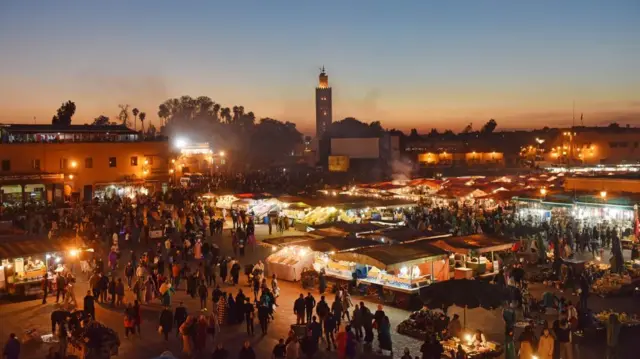
Marrakesh is know as the Red City
Before this deadly natural disaster, the red city of Marrakesh brought in more than 10 million tourists in 2022 and was one of the most popular tourist destinations in Africa.
But this current disaster is not the first setback to affect the tourism sector in the city.
According to Marrakesh's Regional Council, the tourism sector during the pandemic recorded an estimated decline of 80% and experienced a large loss in terms of income, amounting to about $20bn (£16bn).
Back in 2011, I covered the bomb blast which killed 15 people in the Argana cafe on the main square in the city. This incident also affected the numbers of tourists visiting the country.
But these disasters have not prevented the country from regaining tourists once again.
So what keeps people drawn to the red city?
Founded in 1070, Marrakesh boasts a vibrant history, and contains famous landmarks such as the Kutubiyya mosque.
Heavily influenced by Arab, Berber and Islamic civilisations, the city is a melting pot which attracts visitors from across the globe.
When the earthquake happened, friends of mine in the city told me Marrakesh was packed with joyful tourists, and that since the incident the mood has shifted.
A UK search-and-rescue charity is standing by to send a team to Morocco.
Mark Scorer, director of operations at Saraid, told the BBC they are are ready to help if needed - as they did earlier this year following the devastating Turkey earthquake.
Scorer said rescuers could begin providing expert advice and assistance within 12 to 24 hours.
 Ece Göksedef
Ece Göksedef
Live reporter
I am hearing more from Omar Imzilan, a resident of the Atlas Mountains.
He happened to be in Marrakesh when the earthquake hit. Now he is trying to reach relatives in mountain villages, but the road is blocked.
It is feared that remote areas are worst affected. The following pictures were taken on the road from Marrakesh to the mountains.
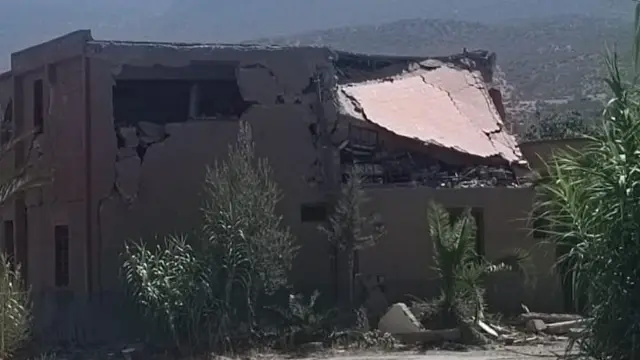 Image source, Omar Imzilan
Image source, Omar ImzilanA house on the Atlas Mountains has been partly damaged
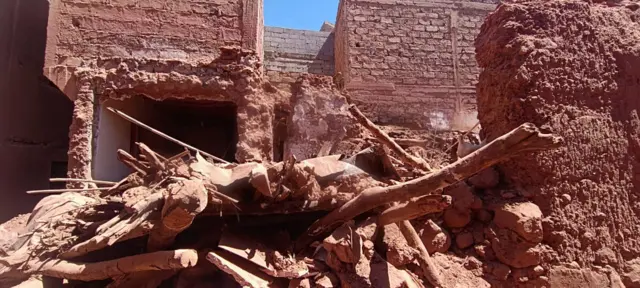 Image source, Omar Imzilan
Image source, Omar ImzilanSome houses collapsed in Asni village in the Atlas Mountains, residents are waiting for help
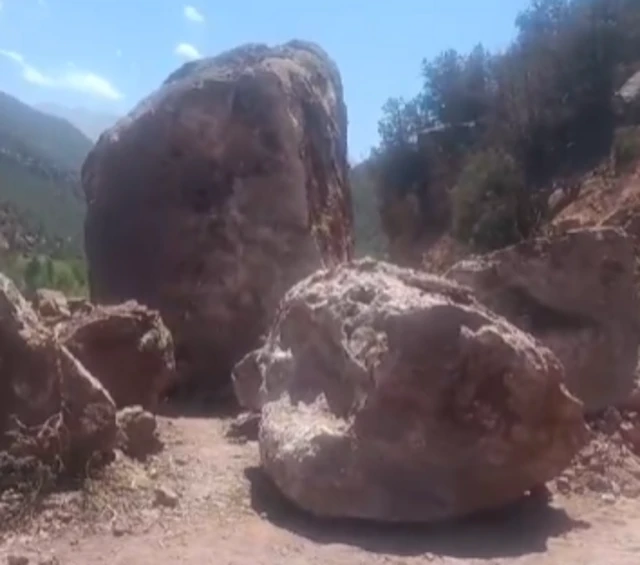 Image source, Omar Imzilan
Image source, Omar ImzilanSome roads are blocked and drivers try to find ways to reach to remote villages
 Image source, Omar Imzilan
Image source, Omar ImzilanA picture taken in the Atlas Mountains from the car on the way to remote villages shows the destruction
It has been more than 14 hours since the earthquake struck, and the death toll keeps rising.
Here is what we know so far:
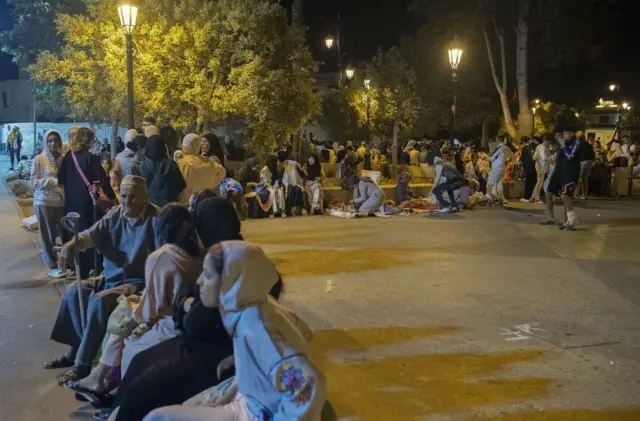 Image source, EPA-EFE/REX/Shutterstock
Image source, EPA-EFE/REX/ShutterstockSome people in Rabat spent the night outside after the earthquake
Journalist Hassan Allawi, who is based in Rabat, felt the earthquake last night, too. In the morning, he started hearing from relatives and friends in Marrakesh.
"The news I got from Marrakesh this morning showed that it was very serious and many people were scared stayed outside," he told the BBC.
"We will probably have more bad news unfortunately," he says.
Allawi, one of the first journalists to reach remote areas in the 2004 earthquake in northern Morocco, recalls how bad the situation there was then:
"I was there very early in the morning with my cameraman. When we reached the area the toll was 600. But at the end, more than 6,000 people died in the same area."
A resident of Casablanca described panic in the port city when the quake struck about 220km (137 miles) away in Marrakesh.
She told Morocco's Le Matin newspaper that people had poured from their homes into public spaces.
“The earthquake shook the door of my apartment. First I thought it was a thief, then I heard the neighbours shouting.
“I was frightened for myself, but especially for my animals. I went into the street with my four cats, hoping for some reassurance, but everyone was panicking. The shouting and wailing of people really made me frightened. People fear another tremor, and also vandalism and thefts,” she said.
 Jonathan Amos
Jonathan Amos
Science correspondent
At Magnitude 6.8, this is a big quake. You would expect very few of this size on Earth in any given year. And, what is more, Morocco is not really the place where they occur.
The main tectonic driver is the collision between the plates that carry the European and African continents.
Most of the earthquake activity from this slow (4mm/year) geological “car crash” is further east in the Mediterranean, around Italy, Greece and towards Turkey.
This quake will be related to the thrusting and faulting that continues to push up the Atlas Mountains.
In terms of history, there has been nothing bigger than a Magnitude 6.0 within 500km (300 miles) of Friday night’s epicentre since before 1900.
This unfamiliarity has consequences.
The quake memory in the population will be limited and so will have been the preparedness. It’s often also the case that quakes that hit at night have bigger death tolls, as people are more likely to be inside collapsing buildings. This one struck at 23:11 local time, when a good many people would have been asleep.
The US Geological Survey runs a model that estimates the probable scale of the casualties and economic losses. It suggests for this event that the death toll could be in the high hundreds to low thousands.
We should prepare for the current toll to rise. We should also watch for aftershocks. As a rule of thumb you might expect to see one that is about one magnitude less than the main shock. But even smaller tremors risk bringing down already damaged buildings.
Aza Lemmer, a Londoner on holiday in Marrakech, was out walking when he heard a blast. He told the BBC he thought at first that it was a terror attack.
“I could feel the ground vibrating. I saw rocks coming down and then realised it was an earthquake. A house I just passed a few seconds earlier started to fall down," he said.
He managed to wake up residents at the place where he is staying and they all moved to safety:
"There was panic among the local people and tourists. People were screaming and running."
The building Lemmer was staying in was well constructed, but surrounding houses were affected.
"I’m hoping to fly back to the UK later today. It’s been a relaxing break up until last night!”
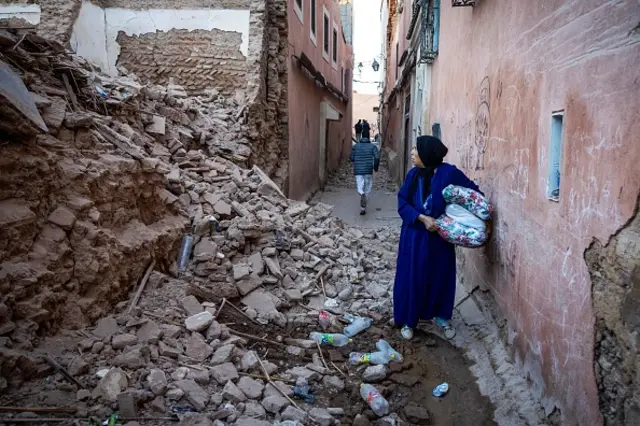 Image source, AFP
Image source, AFPThe old town of Marrakesh, Medine, had many buildings collapsed after the earthquake
 Ece Göksedef
Ece Göksedef
Live reporter
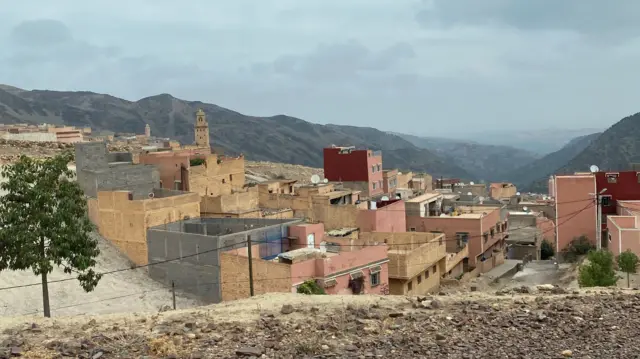
A typical village in the Atlas Mountains
I was in Marrakesh only a few days ago, walking around the very narrow streets that criss-cross the historic city.
I went to the Atlas Mountains too - where the epicentre of the earthquake was - and where people who are mostly Berber live.
The villages in this mountainous area lie far away from each other and only some of them have schools or small medical centres.
My guide during this time was Omar Imzilan, who is from Moulay Brahim, a village in the mountains.
I spoke to him this morning, when he happened to be in Marrakesh, but he was able to contact his family who were all doing fine.
"But my mother told me 16 people were under the rubble of some collapsed houses," he said.
Later, he tried to return to his village, but the road was blocked.
The internet connection there is not very good, so he could only send me a few messages, saying that he could see lots of collapsed houses along the way, including a hotel hosting foreign and Moroccan tourists.
"It will take days for the road to re-open," he added.
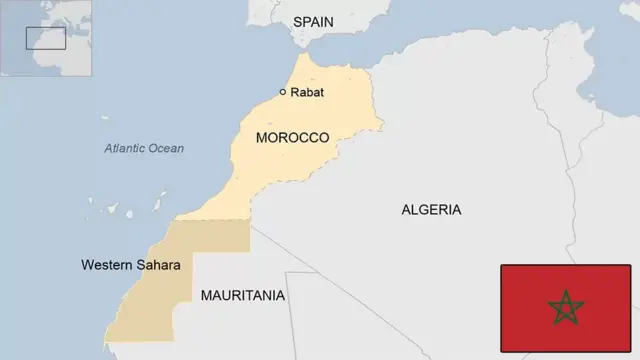
Morocco lies just across the Strait of Gibraltar from Europe
Morocco, lying as it does between Africa and Europe, wields significant influence in both Africa and the Arab world.
It has Atlantic and Mediterranean coastlines, a rugged mountain interior and a history of independence not shared by its neighbours.
Its culture is a blend of Arab, Berber, European and African influences.
Morocco was a French protectorate between 1912 and 1956, and since independence has remained relatively stable.
Prime Minister Rishi Sunak has said the UK was ready to support Morocco.
"My thoughts are with everyone affected by the terrible earthquake in Morocco last night.
"The UK stands ready to support our Moroccan friends," he said in a post on X, formerly known as Twitter.
US President Joe Biden has expressed his sympathy for the victims of an earthquake and said that the US was "ready to provide any necessary assistance".
"I am deeply saddened by the loss of life and devastation caused by the earthquake in Morocco," he said in a statement, external.
And in China, President Xi Jinping has sent a "message of condolence" to Morocco, state media say.
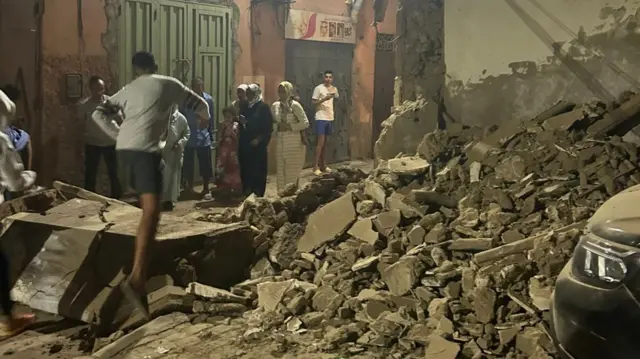 Image source, Clara Bennett
Image source, Clara BennettThe destruction outside Clara Bennett's building in Marrakesh
Clara Bennett, 21, a chemical engineering student from Hampshire, is on holiday in Marrakesh with her parents and brother.
“I was just brushing my teeth and the whole floor shook. There was a roar. It was terrifying," she recalls.
Luckily, the riad (a traditional house) where they were staying was not damaged.
"We came out on the street. Buildings had collapsed around us."
To get out of the old town where all the buildings are very close together, "they had to go through the alleyways into the rubbles to get into an open space".
"We came back to the riad when we made sure it was safe," she adds.
"There was a great sense of community, people carrying disabled people, handing out water and food."
They’re all pretty shook up though and worried about getting home. They are due to fly back on Wednesday.
She asks: "We’ve tried to get flights out, but everything is fully booked. We’d like to know what to do next and what help is available."
British Airways has changed the type of plane used on its route to Marrakesh, should stranded UK tourists need to get home in an emergency.
In a statement, the airline tells BBC News that it has contacted all its customers in Morocco to check they are safe.
"We are continuing to monitor the situation closely, and customers due to travel to or from Marrakesh in the next two weeks can change their dates free of charge if they wish", it adds.
BA's normal flight schedule is currently unaffected by the earthquake.
Mohamed Taha
BBC Arabic
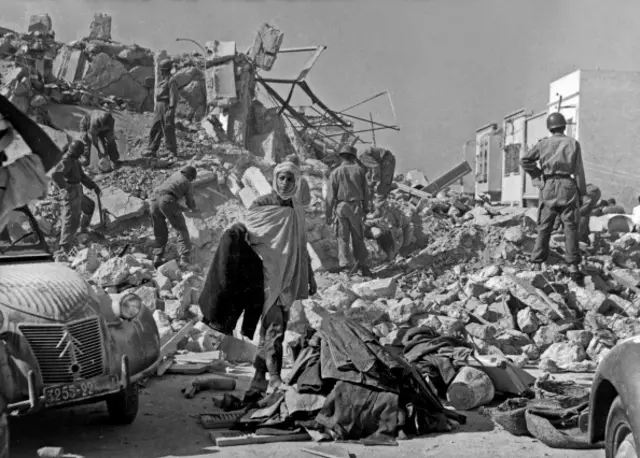 Image source, Getty Images
Image source, Getty ImagesAt least 12,000 people died in the earthquake that hit Agadir in March 1960
Morocco has witnessed some strong earthquakes before, including one in 2004.
An earthquake then hit al-Hoceima in Morocco's north-east, killing 628 people.
And in 1960, the Agadir earthquake killed 12,000 people.
That might give a little indication of the scale of casualties that we might see in this earthquake.
The epicentre of the earthquake last night was in the Atlas Mountains. There are many remote villages that are difficult to reach. It could take many days before we know exactly the scale of this major catastrophe.
The Moroccan interior ministry has also said at least 672 people were injured in the earthquake, including 205 who were in serious condition.
At least 820 people are now said to have been killed in the earthquake, Moroccan state TV has said quoting interior ministry figures.
Authorities warned people all around Morocco not to go back in their houses after the earthquake, so most people spent the night outside.
In Marrakesh, the closest big city to the epicentre, collapsed houses and rubble could be seen when the sun came up.
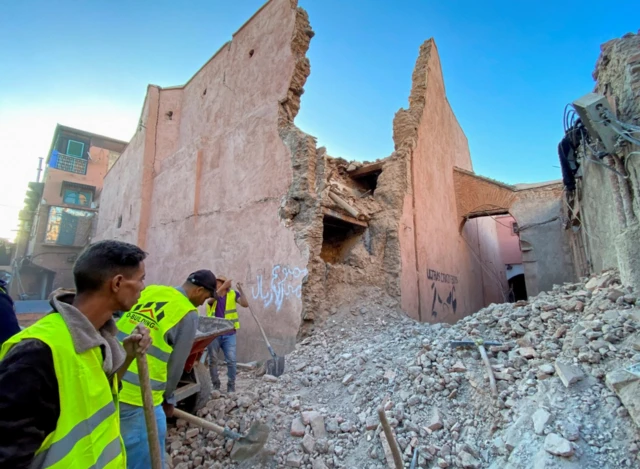 Image source, Reuters
Image source, ReutersRescuers digging rubble in the historic city of Marrakesh
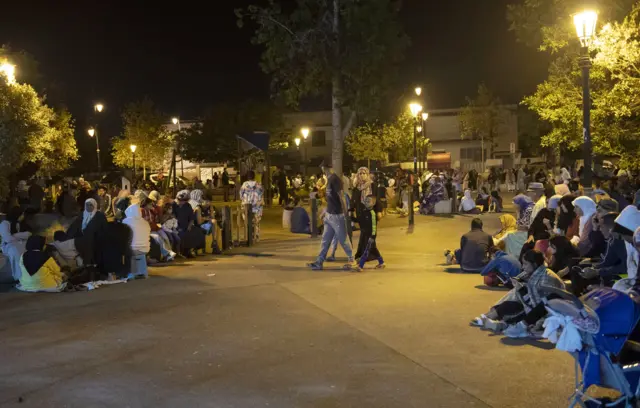 Image source, EPA-EFE/REX/Shutterstock
Image source, EPA-EFE/REX/ShutterstockPeople in the capital Rabat, hundreds of kilometres away from the epicentre, spent the night outside as well, scared of a second earthquake
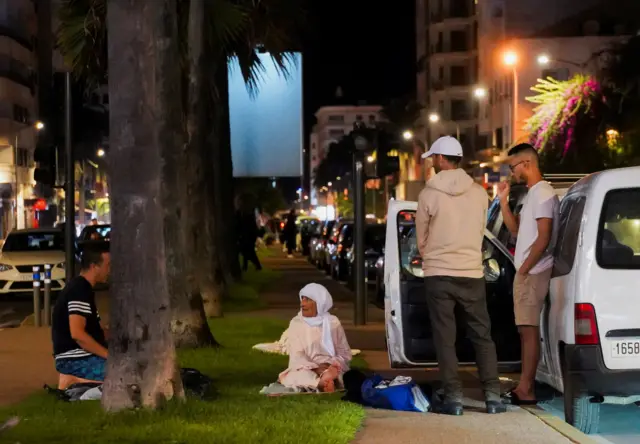 Image source, Reuters
Image source, ReutersPeople gather on a street in Casablanca during the night
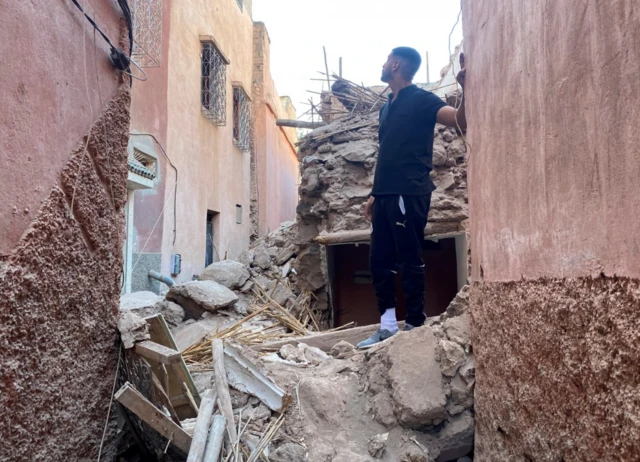 Image source, Reuters
Image source, ReutersDoors to some houses were blocked by the rubble in Marrakesh